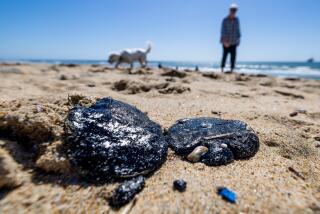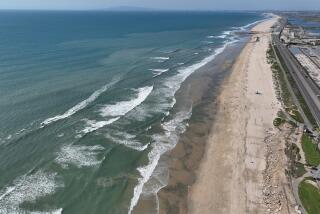The Lessons of Recent Oil Spills
Once again oil has fouled the waters off Huntington Beach, a city that has suffered mightily this year in attacks on some of its premier attractions: the beach and the ocean.
As was true in June, the culprit this month was a shut-down oil pipeline that leaked. During the summer, the leak originally was reported as one barrel, or about 42 gallons. Later that figure was increased to more than 400 gallons. This time the amount disgorged into the ocean also appeared large and lasted for days, though the exact amount spilled has not been determined.
The leaks demonstrate the dangers of drilling in the waters off California, a warning that oil companies will have to rebut in their arguments to put new wells in the water. The pipeline connects three platforms about 10 miles offshore. It is believed to have several holes caused by underwater corrosion. Because the water depth in the area ranges from more than 200 feet to more than 700 feet, fixing the leaks is no easy matter. It’s not just a process of a diver jumping into the sea and easily putting patches in place.
But the difficulty of fixing the problems is something that needs to be considered.
In August, U.S. Interior Secretary Bruce Babbitt canceled four of 40 oil leases proposed for development off the Central Coast.
Last week the state announced it has filed a lawsuit against the federal government to block extensions for an additional three dozen offshore oil leases in that area.
Although the leases were granted two decades or more ago, recent years have brought heightened awareness of the dangers to the environment of oil spills.
Just before Labor Day, several miles of shorefront in Huntington Beach were closed after the waters were found to contain high levels of bacteria. The suspected cause was urban runoff, though it was not established with certainty.
In 1990, the tanker American Trader ran over its anchor, puncturing the hull and spilling more than 400,000 gallons of oil into the waters off Huntington Beach. That spill closed beaches for weeks, killed at least 1,000 birds and cost millions of dollars to clean up. The company that owns the tanker agreed in September to pay $16 million in damages.
California’s waters are valuable for recreation, tourism and fishing. They benefit our economy and our quality of life. But we have learned in recent years of their fragility. We must be careful not to let them become dead zones. The burden is on the operators of the offshore oil platforms to demonstrate that their drilling rigs are safe.
More to Read
Sign up for Essential California
The most important California stories and recommendations in your inbox every morning.
You may occasionally receive promotional content from the Los Angeles Times.










